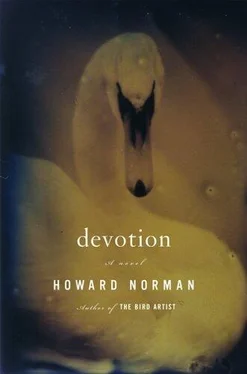Early on the morning of February 10, Maggie drove to the estate, stayed late, and while driving back to Halifax she stopped at the all-night diner for a cup of coffee. There was blowing sleet. Maggie had the windshield wipers going. In the parking lot, before turning off the ignition, she saw David through the diner window. He was paying his bill at the cash register. She sat there, heat cranked up, watching her husband complete his transaction. Neither the car’s nor the diner’s window qualified as amorous, that was for certain. You can’t help where your mind goes, however; Maggie felt the pitch and seethe, the opposing forces of love and hate, though there was a unifying element: she still felt David to be the love of her life. (At the same time, she thought, He has not come to Halifax to say that very thing about me, has he? ) This surprised and saddened her, and then she experienced a surge of disappointment in herself for feeling it. That is, her emotions ran the gamut.
David stepped from the diner, his breath ghosting out— Put on your gloves, she thought. He noticed her car and stopped abruptly, watching Maggie appear and disappear behind the streaking sleet as the wipers arced back and forth. The parking lot had patches of black ice. He walked, slipping once, catching his balance, to her car. Maggie didn’t roll down the window. They looked at each other a moment, then David walked to his truck and climbed in. He fully expected Maggie to continue on to Halifax, but in the rearview mirror saw that she was following him to the estate.
Once inside the guesthouse, Maggie took off her coat and said, “David, I really don’t want to talk. I can’t bear it.” She stood next to the bathtub and dried her hair from the sleet. Viewing this from the kitchen, David felt so grateful for her presence — the painful familiarity in the way she bent slightly, let her hair fall, rubbed it with the towel in furious eddies — that it unhinged him a little. He sat down at the table, his coat still on.
Finally he followed her into the bedroom.
She left at 1:30 in the morning. “I’m driving straight back to Halifax,” she said. “I’m going now, David.” On the return drive she stopped and got that cup of coffee. As she sat sipping it in a booth, her heart felt scored by anger and blame. Nonetheless, she came up with a pairing of words to help her get purchase on the fact of having just slept with her estranged husband: “necessary and confusing” (once she learned she was pregnant, she revised this to “necessary and nostalgic”). She felt a slight cold coming on.
When Maggie got to her apartment on Robie Street, she took a bath, sat in her robe listening to the BBC on her broadband radio, a gift from her father, for almost two hours, trying not to think. She dressed in a favorite pair of black slacks, a peach-colored blouse with a button-down black sweater and, for the first time since her honeymoon, the simple pearl necklace David had given her in his London flat, for what he called their “one-hundred-day anniversary.” It began to snow. Putting on her overcoat, gloves and galoshes, carrying a pair of shoes in an oversize handbag, she left for her Dalhousie office; there was paperwork to catch up on before a 9:15 appointment.
If love has its own velocity, so does love in absentia. He put on a clean T-shirt. He should have taken a shot of whiskey and tried to sleep, or read Anatole France, or listened to Bach. What was that phrase Maggie’s mother used when Maggie was anxious about this or that? Be patient, life will provide. David wasn’t so sure. However, he opted for none of the tried-and-true routines of the past year. Instead, he committed himself to a sequence of actions, each one by itself so compulsive, reckless, he didn’t fear or probably detect their cumulative destructive effect. How could I do more harm than I’ve already done? he might have reasoned, if he reasoned at all. Whereas he should’ve just called it a night.
First he walked to the pond and saw the swans gathered on the far bank. He approached, then dropped to his knees, crawled close, reached under the nearest swan’s backside and attempted to lever it into some sort of reaction — it swung around and bit his shoulder. A significant jolt of pain made him recoil, but he recovered quickly, crawled again toward the gather of now pissed-off swans, all still hunkered down. David let loose a kind of seal-barking: Arrk, arrk, arrk. One swan flared its wings, and in a hydraulic motion raised up and settled down, then waddled off a short ways. Almost immediately there ensued a domino effect: the swans lined up, went single file to the path, began down it toward the pen. However, when they got within feet of the pen David caught up; he began to shout and administer kicks, herding the swans toward the guesthouse. They bustled up onto the porch, crowding at the screen door, so that David had to struggle to get it open.
The swans clambered in, and for some reason the lead swan was almost magnetically drawn to the open-topped plastic garbage pail in the cabinet under the kitchen sink, whose hinged door David had left open. It stretched forward, and in an instant attacked the garbage. The pail was so full that a filter of wet coffee grounds floated at the rim. The swan submerged its head, came up for air and, having nabbed the filter, scattered grounds with a wild shake of its head. A second, then third swan followed suit, tearing into the garbage, which held peach pits, grapefruit rinds, banana peels and apple cores, then abandoned it. Meanwhile, in the sitting room, half a dozen swans went haywire, possibly reacting to having seen their reflection in the oval, full-length mirror in its wood frame on the back of the half-closed bedroom door. Or maybe they’d responded to the Van Morrison record on the turntable, a voice without visible source.
In something of a panic now, David chased the swans with a broom like a cartoon witch, shouting, “Get out! Get out!” Which sounded stupid even to him. Besides, when you invite guests in, you should show them a good time. In the sitting room, yet another swan knocked over a tall vase containing dried cattail rushes, which smashed against the cobble fireplace. It then got a leg caught in the cord connecting the phonograph to the wall socket; immediately the Van Morrison tune “Tupelo Honey” became a horrible scratch as the turntable was yanked to the floor. At which point the swan started biting the vinyl record. The phonograph’s arm was twisted upward, the swan stepped on the needle and lurched, snapping at its own foot as if bitten by a serpent.
David hurried to the pantry, took up the.22 rifle, shoved in a few rounds, fired three shots into the sitting room over the heads of the swans wreaking havoc. One bullet webbed a crack in a window, another splintered the headrest of a rocking chair, a third neatly entered the wall near the fireplace. The swans sat down. David set the rifle on the kitchen table, said, “I’ve done some real damage here,” a statement that stood for so much. He picked up a peach from the bowl, took a bite of it, spit it out, the most familiar and pleasurable taste in the world to him somehow rancid, though it was a perfectly good peach. He glared at the swans. Half of them squatted there in the sitting room, the rest were in the kitchen. They were mute and some had actually begun preening. One swan sauntered over to the fireplace and sat on the empty grate like an iron nest. “You have ugly natures,” David said.
He stood up, put his mouth to the spigot in the kitchen sink, turned on the faucet and drank with loud gulping. It was as if the well water was laced with adrenaline, because David began shouting, “I have got to get out of here! I have got to get out of here!” about thirty times in a row, in a repetitive tone like a skipping record.
Читать дальше












